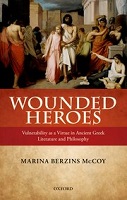Wounded Heroes
Vulnerability as a Virtue in Ancient GreekLiterature and Philosophy
Author(s)
Berzins McCoy, Marina
Collection
OAPEN-UKLanguage
EnglishAbstract
Vulnerability is not often associated with virtue. Yet to be vulnerable is central to human experience. In this book, McCoy examines ways in which Greek epic, tragedy, and philosophy have important insights to offer about the nature of human vulnerability and how human beings might better come to terms with their own vulnerability. While studies of Greek heroism and virtue often focus on strength of character, prowess in war, or the achievement of honor for oneself or one’s society, McCoy examines another side to Greek thought that extols the recognition and proper acceptance of vulnerability. McCoy begins with the literary works of Homer’s Iliad, Sophocles’ Oedipus Rex, Oedipus at Colonus and Philoctetes before expanding her analysis to philosophical works. There, she analyzes imagery of wounding in Plato’s Gorgias and Symposium as well as Aristotle’s work on the vulnerability inherent in friendship and an innovative interpretation of tragic catharsis in the Poetics. As much a work of philosophy as of classical textual analysis, McCoy’s work aims at a deeper understanding of the virtues of vulnerability for individuals and societies alike.
Keywords
plato; suffering; wounds; virtue; tragedy; homer; vulnerability; sophocles; aristotle; greek philosophy; Achilles; Alcibiades; Creative Commons; Neoptolemus; Oedipus; Philoctetes; Socrates; TheseusDOI
10.1093/acprof:oso/9780199672783.001.0001ISBN
9780199672783OCN
1030815961Publisher
Oxford University PressPublisher website
https://global.oup.com/Publication date and place
2013Grantor
Classification
Ancient, classical and medieval texts
Literary studies: ancient, classical and medieval
Ancient history
Ancient Greek and Roman philosophy


 Download
Download Web Shop
Web Shop